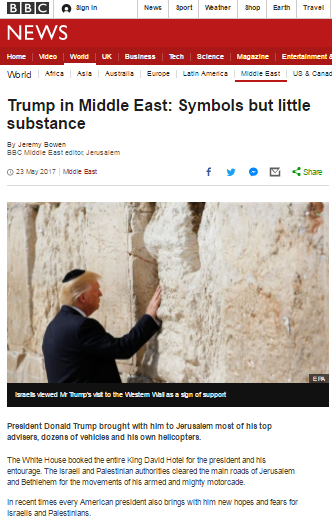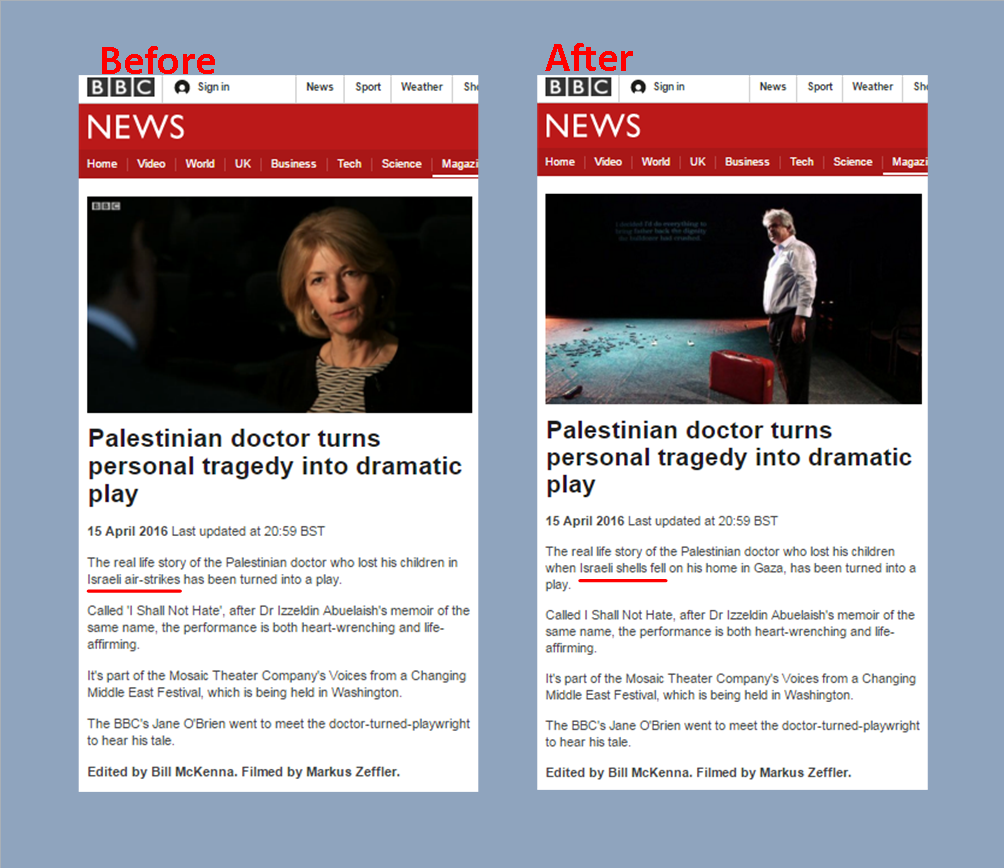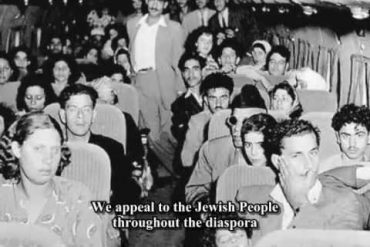In previous posts we looked at how the opening of the US embassy in Jerusalem and the rioting along the Gaza Strip-Israel border were portrayed as they happened in the May 14th afternoon edition of the BBC World Service radio flagship news and current affairs programme ‘Newshour‘ (available here).
BBC WS radio’s ‘Newshour’ and the split screen – part one
BBC WS radio’s ‘Newshour’ and the split screen – part two
BBC WS radio’s ‘Newshour’ and the split screen – part three
In this post we will look at what BBC audiences worldwide were told in real-time about the context to the poorly portrayed violence along that border.
The long introduction given by presenter Razia Iqbal included misrepresentation of the locations of previous ‘Great Return March’ events – which actually were confined to the Gaza Strip border. Iqbal also promoted the blatant falsehood that the displacement of all Palestinians in 1948 was “forced”.
01:28 Iqbal: “Dates are significant here. It is the 70th anniversary of the foundation of Israel and there has been a six-week protest by Palestinians in Jerusalem, the West Bank and – the most deadly – in Gaza. Scores have been shot dead by Israeli soldiers on the Gaza-Israel border. The protests are to culminate on May the 15th, tomorrow, called the Nakba or catastrophe by Palestinians as the day when they were forced from their land and homes as Israel was established.”
In contrast to the very clear – but inaccurate – impression given by Razia Iqbal, the facts are of course much more nuanced:
“Historians agree that there was no single cause of the Arab flight from Palestine. In large part, the masses fled because they saw the Palestinian elite doing the same thing. In part, it was in response to exhortations by Arab military and political leaders that Palestinian civilians evacuate their homes until the end of the fighting. Vast numbers were simply fleeing the heavy fighting that surrounded them, or that they expected to soon disrupt their lives. In some instances, Palestinians were forced from their homes by the Jewish military.”
The vast majority of the context to what was, as we saw earlier, overwhelmingly portrayed as “peaceful marches” and “protests” came in Yolande Knell’s report near the beginning of the programme.
05:15 Iqbal: “Yolande, just remind listeners that this has been going on for several weeks now and it’s very specifically to mark a day tomorrow for the Palestinians.”
Knell: “That’s right. This has been called the Great March of Return by the Palestinians. It was organised in Gaza over the past 6 weeks. The 15th of May is always a date of protest for Palestinians when they remember how, back in 1948, more than 700,000 people lost their homes on land that became part of Israel. [….] The people [Knell spoke to in Gaza] were saying that they really felt that the historic injustice as they saw it was at the heart of all the modern-day problems that they have in Gaza, where they have chronic electricity shortages, this long-time blockade that’s been enforced by Israel and Egypt which now means that the Gaza Strip is an extremely poor place – it suffers from extremely high unemployment.”
Obviously the fact that there are chronic electricity shortages in the Gaza Strip has nothing whatsoever to do with the refugee issue (it is, as Knell well knows, in fact due to infighting between Hamas and Fatah) and neither do the counter-terrorism measures imposed by Israel and Egypt in response to the surge in terrorism since Hamas’ violent coup in the Gaza Strip in 2007. Knell went on:
Knell: “One woman told me ‘I wouldn’t have come down here if Gaza wasn’t in the state it was but people need to see what the issues are for us’. They felt that this was putting back the suffering of people in Gaza back into the spotlight. Also a lot of concern…they think that the issue of Palestinian refugees – which is a key issue in the Israel-Palestinian conflict – they feel that there have been attempts – particularly by Washington – to try to push this off the table of any future negotiations. They say that because of course earlier this year the US did announce big cuts to the UN agency for Palestinian refugees, UNRWA.”
Yolande Knell (nor anyone else in this programme) made no effort to inform listeners why Palestinians – even when living under PA or Hamas control – are still kept in refugee status by UNRWA, their own leaders and the leaders of Arab countries seventy years on.
Listeners were also told that:
Knell: “Now on top of that, another key issue – the future status of Jerusalem. That is also at stake and of course that’s just added fuel to the flames, brought more people out for these demonstrations. “
As we see, listeners to this broadcast were wrongly led to believe that Palestinians were ‘protesting’ on the border because of a bad electricity supply, high unemployment and poverty – even as the BBC serially ignored the repeated attacks by ‘protesters’ on the Kerem Shalom crossing.
Additional factors cited included “the future status of Jerusalem” and the anniversary of a “historic injustice” which Knell failed to put into its correct context. Interestingly, while BBC reports on previous bouts of ‘Great Return March’ violence had touted the ‘right of return’ that is supposedly the publicity stunt’s raison d’être (see for example here and here), in this report that topic was largely avoided and listeners were not informed of the basic fact that the Palestinian demand for ‘right of return’ means rejection of the two-state solution and that its real intention is to threaten the existence of Israel as the Jewish state.
Listeners also heard nothing of the fact that the ‘Great Return March’ events were organised by factions including Gaza-based terror groups. They were not told of the payments made by Hamas to participators or of the organisers’ calls for breaching of the border fence and ‘martyrdom‘. Even Yahya Sinwar’s March 31st statement of intent – “We will take down the border and we will tear out their hearts from their bodies” – did not receive any BBC coverage either in this programme or elsewhere.
Sadly it is all too obvious that both of the topics covered in this May 14th ‘split screen’ edition of Newshour – the opening of the US embassy in Jerusalem and the rioting on the Gaza border on the same day – were presented in a manner intended to amplify a specific political narrative rather than to provide BBC audiences with “accurate and impartial news […] of the highest editorial standards so that all audiences can engage fully with issues” as required by the corporation’s public purposes.
In the context of the question of whose interests this edition of ‘Newshour’ served, it is worth noting what Hamas’ leader Yahya Sinwar had to say about the Western media’s ‘split screen’ reporting two days after this BBC programme was broadcast:
“Our people have imposed their agenda upon the whole world. There was supposed to be a romantic picture of the opening of the U.S. embassy in Jerusalem on the world’s television screens, but our people, in their collective consciousness, forced the whole world to split the television screens between the footage of fraud, deception, falsehood, and oppression, manifest in the attempt to impose Jerusalem as the capital of the occupation state, and between the image of injustice, oppression, heroism, and determination painted by our own people in their sacrifices – the sacrifice of their children as an offering for Jerusalem and the Right of Return.”
Related Articles:
BBC WS radio’s ‘Newshour’ and the split screen – part one
BBC WS radio’s ‘Newshour’ and the split screen – part two
BBC WS radio’s ‘Newshour’ and the split screen – part three
BACKGROUNDER: PALESTINIAN ARAB AND JEWISH REFUGEES (CAMERA)




